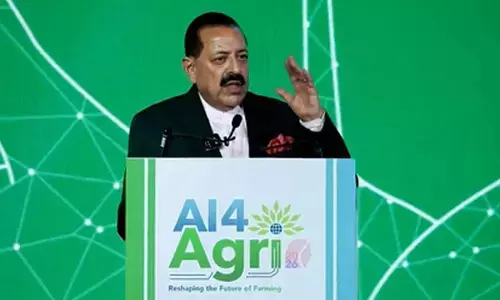The siblings God never gave us

“Friendship is unnecessary, like philosophy, like art ... It has no survival value; rather it is one of those things which give value to survival” – ‘The Four Loves’ – C S Lewis. Edward Gibbon famously said that, “I was never less alone, than when by myself.”
Friends help prevent loneliness or isolation, and are supportive companions as one works toward living a purposeful life. They can also encourage one to pursue one’s passions and dreams, and offer support or advice in hard times. “A friend in need is a friend indeed” is a universally accepted dictum that serves to highlight the value of true friendship when one is in need of help. Friendships also help preserve mental health and overall happiness
“Friendship is unnecessary, like philosophy, like art ... It has no survival value; rather it is one of those things which give value to survival” – ‘The Four Loves’ – C S Lewis. Edward Gibbon famously said that, “I was never less alone, than when by myself.”
While one fully appreciates the depth of sentiment behind that subtle statement, it is generally accepted that, since man is a social animal, the supportive company of friends adds to the confidence and reassurance a person feels. It is to honour the importance of friends in our life that the International Friendship Day, recognised by the United Nations, is celebrated every year on 4 August in several countries, including India.
Friendship plays an important role in our lives, by virtue of its ability to it help people build connections, with people who share their values or interests. Friends help prevent loneliness or isolation, and are supportive companions as one works toward living a purposeful life. They can also encourage one to pursue one’s passions and dreams, and offer support or advice in hard times. “A friend in need is a friend indeed” is a universally accepted dictum that serves to highlight the value of true friendship when one is in need of help. Friendships also help preserve mental health and overall happiness. People build connections in their professional and personal lives and, over time, those connections grow. And many friendships last for life.
Many remarkable and great friendships have been known in the history of mankind, as well as in famous fictional stories, which are popular throughout the world. Helen Keller and Alexander Graham Bell were, for example, longtime friends, having first met when Helen was only six years old Keller dedicated her first autobiography to Bell years later. One was a woman who rose above extraordinary challenges, to become a celebrated author, and the other, an inventor and scientist, most well-known for inventing the telephone.
Likewise, Tom Sawyer and Huckleberry Finn are two fictional characters in Mark Twain’s popular children’s novel ‘The Adventures of Tom Sawyer.’ They are close friends, but are also very different from each other. While one lives in a well-respected family, the other is abandoned out onto the streets; one liked by almost everyone in the community and the other looked down on by society.
Although there are many real, and imaginary, accounts of hundreds of people who are friends of kings, rich people, Maharajas, administrators and others, the story, from the ‘Bhagavata’ or the story of Lord Krishna, really stands out, for its touching theme; the story of Kuchela having a friendship with Lord Sri Krishna, which transcended the boundaries of rich and poor, Gods and human beings. Kuchela’s family lives in abject poverty, and often faced starvation, with Kuchela having to perform rituals in temples for a living. Kuchela then thinks of his childhood friend, and, upon his wife’s advice, proceeds to Krishna’s palace to seek assistance. Krishna, pleased to see his friend after a long time, receives Kuchela with warmth and affection. They share many childhood memories. At one point Krishna asks whatthere is inside the cloth tied to a stick, which Kuchela is carrying. When told that there is poha in the cloth, all that Kuchela had to offer his friend, Krishna opens it and eats some of it happily. Kuchela, who could not confide in Krishna about his situation, leaves the palace, his purpose not served, but carrying pleasant memories.
When Kuchela reaches his home, he is astonished to see a palace in place of their small hut, and wife and children sporting nice clothes and jewelry. Kuchela realises that that is Lord Krishna’s grace. That friendship was so great that it is still spoken of, for ages.
In the Hindu epic, Mahabharata, the Pandava and the Kaurava princes are traditional rivals, although being children of the two brothers, Dhritarashtra and Pandu. Once, an archery examination is conducted in Hastinapur, the capital of Dhritarashtra kingdom. After many of the Royal Cousins have exhibited their skills with different types of weapons, Arjuna, regales the audience with his amazing prowess with the bow and arrow. That is followed by Karna, who also demonstrates his remarkable skill in archery. When a competition between the two great arches was mooted, the elders, and the gurus, object on the ground that Karna is not a Kshatriya, or a person of Royal blood. Karna, as a matter of fact, has been brought up by a charioteer and his wife. Unbeknownst to all except Bhishma, he is originally the first son of Kunti, the mother of Pandavas. Duryodhana then bestows the kingdom of Anga upon Karna in order to qualify him for the competition. In the Kurukshetra War, Karna is Duryodhana’s greatest champion, and serves as the Commander of the Kaurava army, from the fifteenth day in the 18-day war.
A story is told in the Holy Bible of David who was a shepherd. Jonathan is a prince. He has his own armor; David has a harp and a slingshot. Jonathan grew up in the palace and was trained in the art of war; David grew up in the “little town of Bethlehem” and was trained to tend sheep. Jonathan was the oldest son and in line to inherit the throne. Jonathan was of the tribe of Benjamin; David the tribe of Judah. Despite their differences, they were arguably among the best friends the world had ever known.
Friendships can be dicey relationships. They may start as feeble and formal acquaintances but mature into strong bonds. And, no matter what their age and how much the intensity, the slightest misunderstanding can sometimes prove to be the beginning of the end. But, at the end of the day, the test of true friendship lies in the relationship weathering ups and downs, building on the strength of lessons learnt from challenges to its sustainability. Witness, for example, how India and China, having once gone so far as to go to war against each other, have now most gratifyingly begun to take the first few steps in the journey of rediscovering their ancient links.
The slogan ‘Hindi-Chini Bhai Bhai’ was popularised by Prime Minister Jawaharlal Nehru during the 1950s. It was intended to promote friendship and solidarity between India and China, particularly during a time when both countries were emerging as independent nations. It reflected the hope for peaceful coexistence and cooperation between the two nations, especially after the signing of the Panchsheel Agreement in 1954. However, the relationship later deteriorated, culminating in the Sino-Indian War of 1962.
The value of clichés, no matter how disparagingly they are looked down upon, lies in their lasting quality, much like the maturing of an old wine in a cask. So, if someone says that when one has a friend like you, one does not fear even sky as an enemy, do not be overcome with pride and joy. Hold the bubbly as they say! Freely translated, it really means that, although you appear to be a friend, you are treating that person more as an enemy would!
(The writer was formerly Chief Secretary, Government of Andhra Pradesh)








